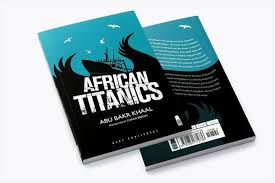‘African Titanics’: A Book to Humanize the Reader
 The short novel, written by Eritrean novelist AbuBakr Khaal (2008), and ably translated by Charis Bredon (2014), could be read as a “there but for the grace of God go I!” narrative. From this vantage, the book is about poor migrants who make their way up through desert and sea to start new, better lives in Europe. Or, for the reader interested in world events, it could be read as a “humanizing” tale that fleshes out news about nameless migrants who die at sea aboard overcrowded, under-maintained boats.
The short novel, written by Eritrean novelist AbuBakr Khaal (2008), and ably translated by Charis Bredon (2014), could be read as a “there but for the grace of God go I!” narrative. From this vantage, the book is about poor migrants who make their way up through desert and sea to start new, better lives in Europe. Or, for the reader interested in world events, it could be read as a “humanizing” tale that fleshes out news about nameless migrants who die at sea aboard overcrowded, under-maintained boats.
It could be a call-to-action that drives the activist reader to tear down militarized borders across the Mediterranean and beyond. Or it could be approached as a story about stories: a layering of folktale, myth, history, and anecdote from East and North Africa.
Or, in another approach, it is a many-sided memorial to all those who have died as migrants on the dry and wet seas.
It is, in any of these readings, a page-turner that follows the narrator, Abdar, as he hears the siren call of migration and makes the decision to leave his few opportunities in Eritrea and travel north through the desert. He heads for the coasts of Libya and Tunisia, imagining he might make it across the Mediterranean. Abdar’s central story is beautifully interlaid with flash-sideways folktales and flash-forward glimpses of the future lives of his traveling companions.
The obstacles Abdar, Terhas, Malouk, and others meet are as confounding as in any epic adventure. The most gut-wrenching moments are not just the cruel, slow deaths of characters we’ve come to love, but the small happinesses: the fate of Malouk’s guitar, the kindnesses from resident North Africans. For example, with this hostel-owner in Tunisia, who doesn’t demand passports from his guests:
“’You’re rather famous, Si Najih!’ I smiled as we headed down the corridor.
“’For what?’ he demanded, perplexed.
“’For your understanding. For not demanding the impossible.’
“’You lot have enough to deal with as it is.’”
Outside of these, there are too many cruel moments to mention. Indeed, this novel would be a dystopia if it weren’t so real.
Abu Bakr Khaal lives in Denmark now, after many years in Libya and several months in a Tunisian refugee camp during Libya’s recent uprising. But, while this book might borrow from Khaal’s own experience, it is not an autobiographical narrative. It’s a carefully crafted layering of not just contemporary realist stories but myth and folk history. Those reading the book for its reflection on the day’s news might be tempted to skim the “story within a story” sections, but these are essential muscle and bone. One such history tells of a stone that begins to speak out against the oppression of humans, who don’t appreciate being pitied by a stone and “bury it in a pit a thousand feet deep[.]”
This is, after all, not just about how people get from A to B (or die between A and B), but about how stories change the shapes of our lives and memories. So: What might a story about migrants change?
This excerpt of a song sung by a mythicized dead man tells us something:
I will cut
Through these paths
With my own liberated heart
And tell my soul
To shout of your silenced deaths
And fill
Palms of dust with morning dew
And song
Clearly, there is no novel that “humanizes” its subject — the subjects were already human: before, during, and after the book. But there are some novels that humanize the reader, making us more fully aware of the worlds inside ourselves. This is such a novel.
.
Soure:http://arablit.org/2015/04/07/african-titanics/
Short URL: https://english.farajat.net/?p=9514















